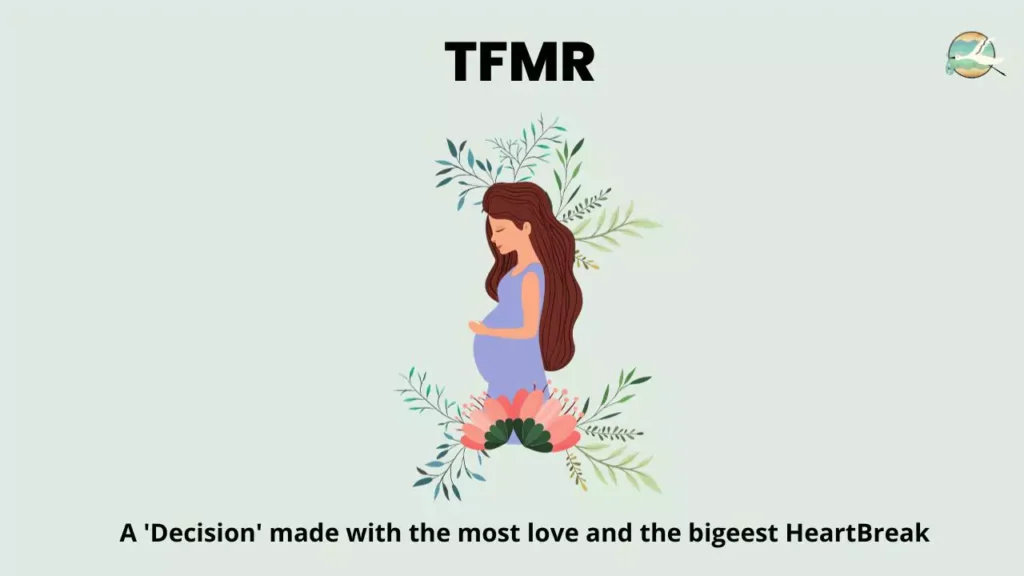TFMR Pregnancy is a subject that continues to be wrapped in stigma in society when talking about mental health, reproductive health, and pregnancy-related difficulties is becoming more open. This article aims to clarify this frequently misunderstood and neglected component of reproductive health.
Table of Contents

What is a TFMR Pregnancy?
“TFMR Pregnancy” or “Termination for Medical Reasons” refers to the choice to terminate a pregnancy owing to medical complications affecting either the fetus or the mother. Despite the fact that it is not a clinical term included in medical textbooks, it has become a common expression in the medical field and among individuals who have experienced it.
It is crucial to state unequivocally that TFMR is a form of abortion. It is, however, distinct in that it is made after careful consideration, typically when the fetus has been diagnosed with serious defects or when continuing the pregnancy offers a major risk to the mother’s health.
What are the signs and symptoms of a TFMR pregnancy?
There are no specific signs or symptoms of a TFMR pregnancy. However, some general signs may indicate a problem with the pregnancy, such as:
- Bleeding: During pregnancy, vaginal bleeding is not always a symptom of a problem. However, if you encounter any bleeding, especially if it is heavy or accompanied by other symptoms like discomfort or cramps, you should visit a doctor straight away.
- Reduced fetal movement: If you observe a decrease in your baby’s movement, you should consult a doctor as soon as possible. This could be an indication of a pregnancy problem, such as fetal distress or growth restriction.
- Pain: Pain that is severe or unexpected during pregnancy is grounds for concern. If you are in pain, visit a doctor right away, especially if it is accompanied by other symptoms such as bleeding or cramping.
- Vaginal discharge: An increase in vaginal discharge, particularly if it is foul-smelling or discolored, may indicate an infection. If you notice any changes in your vaginal discharge, you should see a doctor right once.
What are the options for TFMR?

There are numerous ways for terminating a pregnancy for medical reasons depending on the stage of pregnancy and the exact circumstances. These are a few examples:
Medical Abortion: This involves the use of drugs to induce pregnancy termination. It is often employed during the early stages of pregnancy and is considered the ideal option when possible because of fewer risks of problems.
Surgical Procedures: These are frequently required when the pregnancy is too advanced for a medical abortion. Dilation and Curettage (D&C) and Dilation and Evacuation (D&E) are two of them.
Induced Labor: In some situations, labor may be induced to end a pregnancy after 14 weeks. This is usually done in a hospital and may include the use of shots to silence the fetal heartbeat prior to induction.
How is a TFMR pregnancy diagnosed?
A TFMR pregnancy is detected using a variety of tests, including:
Prenatal screening tests: During standard prenatal care, all pregnant women are given these tests. They can detect pregnancies that are at high risk for specific genetic abnormalities, such as Down syndrome and Trisomy 18.
Diagnostic tests: If a screening test reveals that your baby is at high risk for a genetic condition, your doctor may suggest diagnostic tests. These tests can determine whether your baby has the disorder.
Ultrasound: Ultrasound is a non-invasive imaging procedure that can be used to assess your baby’s growth and development. It can also be used to detect structural irregularities.
Amniocentesis: Amniocentesis is a process in which a sample of amniotic fluid is extracted from the sac that surrounds your baby. The fluid is then examined for genetic diseases and chromosomal abnormalities.
Chorionic villus sampling (CVS): CVS is a process that removes a sample of chorionic villi from the placenta. The villi are then examined for genetic and chromosomal abnormalities.
If any of these tests reveal that your baby has a major medical problem, your doctor may suggest TFMR. This is a personal choice, and there are no correct or incorrect answers.
It’s worth noting that not all TFMR pregnancies are detected before birth. A medical problem may not be discovered until after the baby is born in some situations. If the baby’s condition makes living impossible, the healthcare staff may recommend TFMR.
If you are considering TFMR, your healthcare professional will inform you of the procedure’s risks and benefits. They will also assist you in making the best option for you and your family.
What are the emotional and practical implications of a TFMR pregnancy?

Emotional implications of TFMR pregnancy
One of the most painful decisions a parent can make is to terminate a pregnancy for medical reasons (TFMR). It is a difficult and emotional process that can have serious consequences for the parent’s mental health.
Following TFMR, parents commonly experience the following emotions:
- Grief: TFMR is a loss, and parents may go through the entire grieving process, including shock, denial, anger, depression, bargaining, and acceptance.
- Guilt: Even though they know it is the greatest option for their family, parents may feel guilty about terminating the pregnancy.
- Shame: Parents may feel ashamed of their decision, particularly if they are religious or come from a culture that views abortion negatively.
- Anxiety and depression: Parents may experience anxiety and depression during and after the TFMR.
- Anger: Parents may be upset with themselves, their partner, the physicians, or God.
- Confusion: Parents may be perplexed by their feelings and how to cope with the loss.
Practical implications of TFMR pregnancy
TFMR can have a number of practical consequences in addition to its emotional impact. Parents may require time away from work to grieve and recover after the treatment. They may also need to make childcare arrangements for their other children.
TFMR may have financial ramifications in various instances. Parents may be required to pay for the operation as well as any accompanying expenditures like travel and lodging.
Support for parents after TFMR
There are numerous resources available to assist parents following TFMR. These are some examples:
Counseling: Counselling can assist parents in understanding and dealing with their feelings.
Support groups: Support groups can provide a secure area for parents to talk with other people who have experienced TFMR.
Online resources: Websites, forums, and chat rooms are among the internet resources available to parents following TFMR.
Knowing you are not alone as a parent who has suffered TFMR is crucial. There are individuals out there who care about you and want to assist you. If you require assistance, please contact us.
Why TFMR Occurs?
TFMR may occur for a variety of reasons, most of which are related to significant fetal abnormalities or maternal health hazards. These problems can occur at any stage of pregnancy and, in certain cases, can be fatal.
Severe genetic or chromosomal abnormalities, such as Down Syndrome or Trisomy 18 (Edwards Syndrome), and structural defects, such as anencephaly, are some of the most common problems that can result in a TFMR pregnancy. In certain circumstances, the fetus may not live to term or may have a drastically diminished quality of life after birth.
Furthermore, maternal health issues such as serious infections, severe preeclampsia, or cancer that requires treatment that is incompatible with pregnancy may demand TFMR. The decision to continue with a TFMR is frequently challenging and takes into account the particular circumstances of each case.
Is TFMR the same as abortion?
Yes and no.
TFMR, or termination for medical reasons, is a form of abortion. However, not all abortions are TFMRs. TFMRs are only conducted when the fetus or mother has a medical problem that requires the pregnancy to be terminated. Conditions such as:
- Down syndrome and Trisomy 18 are examples of chromosomal disorders.
- Cystic fibrosis and sickle cell anemia are examples of genetic illnesses.
- Heart problems or spina bifida are examples of structural abnormalities.
- Pregnancy issues that endanger the mother’s health or life, such as preeclampsia or HELLP syndrome
Other types of abortion, such as elective abortion, are conducted for personal reasons, such as not wanting to have a child at that time or not being able to afford to raise a kid.
It is vital to mention that the decision to TFMR is highly personal. There is no right or wrong response, and families should make the decision that is best for them.
Here is a table that summarises the key differences between TFMR and abortion:
| Characteristic | TFMR | Abortion |
|---|---|---|
| Definition | Termination of a pregnancy due to a medical condition with the fetus or mother | Termination of a pregnancy for any reason |
| Reasons | Chromosomal abnormalities, genetic disorders, structural abnormalities, pregnancy complications | Personal reasons, such as not wanting to have a child or not being able to afford to raise a child |
| Prevalence | Less common | More common |
| Stigma | More stigmatized | Less stigmatized |
It is essential to highlight that the stigma associated with TFMR is frequently attributed to the fact that it is a form of abortion. It is crucial to realize, however, that TFMR is not the same as elective abortion. TFMR is a difficult and often tragic decision made by families when they have no other choice.
Final Thoughts
TFMR is a tough and complex decision, but it is a crucial alternative for families facing a major medical problem with their fetus or mother. When deciding on TFMR, there are several emotional and practical aspects to consider, and it is critical to seek assistance from loved ones and healthcare professionals.
It is also vital to realize that TFMR is not the same as elective abortion. TFMR is performed for medical reasons, whereas elective abortion is undertaken for personal ones. The stigma surrounding TFMR is frequently related to the fact that it is a sort of abortion, however, it is vital to note that TFMR is a totally distinct experience.
If you are debating whether or not to TFMR, please know that you are not alone. There are many people who understand what you’re going through and can provide you with assistance.




